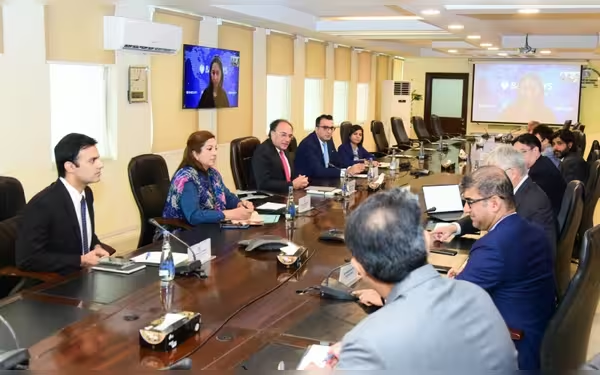Saturday, November 16, 2024 05:58 PM
Pakistan's Commitment to Structural Reforms: Aurangzeb Assures Investors
- Pakistan remains focused on structural reforms for economic stability.
- Inflation has significantly declined to a 44-month low of 6.9%.
- Government encourages private sector lending to stimulate growth.
 Image Credits: brecorder
Image Credits: brecorderFederal Minister Aurangzeb assures foreign investors of Pakistan's commitment to structural reforms and economic stability amid positive changes.
In recent discussions with international investors, Federal Minister for Finance Muhammad Aurangzeb emphasized that the government of Pakistan remains steadfast in its commitment to structural reforms. This assurance comes at a crucial time when foreign investors are keenly observing the economic landscape of Pakistan, particularly after a series of reforms aimed at stabilizing the economy.
During a meeting with a delegation led by Barclays at the Finance Division, Aurangzeb highlighted the positive changes taking place in the country. Investors expressed their satisfaction with the improvements they have witnessed, noting that “things have started looking up in Pakistan.” This sentiment reflects a growing confidence in the Pakistani economy, which has been bolstered by various structural reforms across different sectors.
Aurangzeb reiterated the government's focus on key areas such as energy, state-owned enterprises (SOEs), privatization, taxation, and rightsizing of government. He pointed out that Pakistan has historically been viewed as a “single-tranche country,” but he believes it is time to change this perception. The minister stressed the importance of adhering to the structural benchmarks set forth in the program with the International Monetary Fund (IMF) to ensure lasting macroeconomic stability.
In his briefing, Aurangzeb outlined the policy interventions and initiatives that have been implemented over the past year. He provided an overview of the improvements in key economic indicators, including the management of twin deficits, stabilization of the currency, and the maintenance of foreign exchange reserves. Notably, inflation, which had been a significant concern, has seen a remarkable decline from a high of 38% last year to a 44-month low of 6.9% in September this year, signaling a potential economic recovery.
The finance minister also highlighted the successful conclusion of a nine-month IMF Stand-By Arrangement (SBA), which has paved the way for a larger Extended Fund Facility (EFF). This arrangement is crucial for ensuring the permanence of macroeconomic stability and implementing necessary structural reforms. Aurangzeb noted that the current fiscal year has begun on a positive note, with the current account deficit remaining under control, thanks to strong remittances and healthy flows from the Roshan Digital Account (RDA).
Furthermore, Aurangzeb shared insights into the government’s strategy to encourage banks to lend to the private sector. He mentioned the incentives provided in the budget to promote micro-lending, particularly in agriculture, the IT sector, and small and medium enterprises (SMEs). This approach aims to stimulate growth by allowing the private sector to take the lead, supported by a stable policy framework from the government.
The commitment of the Pakistani government to structural reforms and economic stability is evident. As the country navigates through these changes, the positive feedback from international investors serves as a testament to the potential for growth and development. With a focus on collaboration between the government and the private sector, Pakistan is poised to create a more robust economic environment that can attract further investment and foster sustainable growth.













